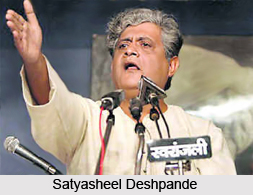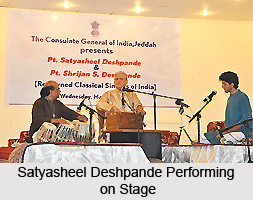 Satyasheel Deshpande has been reckoned as an unusually talented creative musician who has always attempted to magnetize the listeners of Hindustani Classical Music through his excellent composition and captivating performances. Apart from being a noted performer he has also bagged the identity of being an author, researcher and an esteemed guru.
Satyasheel Deshpande has been reckoned as an unusually talented creative musician who has always attempted to magnetize the listeners of Hindustani Classical Music through his excellent composition and captivating performances. Apart from being a noted performer he has also bagged the identity of being an author, researcher and an esteemed guru.
Early Life of Satyasheel Deshpande
Satyasheel Deshpande was born in the year 1951 at Mumbai. From his early years he has came in contact with the music maestros like Pandit Bhimsen Joshi, Padmabhushan Mogubai Kurdikar, Pandit Vasantrao Deshpande and Pandit Kumar Gandharva at his home. He was born to illustrious musicologist Pandit Vamanrao Deshpande. Pandit Kumar Gandharva later on became his guru. By the year of 1972, Satyasheel Deshpande decided to consecrate himself to the realm of music. To fulfil the purpose, he went to the town of Devas to imbibe Kumarji`s unique style of music. After completing his training under Kumarji he came back to Mumbai and started performing on a regular basis.
 Career of Satyasheel Deshpande
Career of Satyasheel Deshpande
Satyasheel Deshpande has exhibited his performance throughout the world at various music festivals and highly esteemed occasions in an extensive manner. He journeyed through, Paris, the UK and the US. In all most all his performances he has skilfully attempted to combine respective styles of music, technical approaches and compositions of his gurus. In the year 1989, Satyasheel Deshpande has exhibited his performance at the India International Centre in New Delhi. It was his momentum performance of raaga. At the programme he has attempted to combine the styles of various gharanas. He has shown the way through which each approach to the same raga complete with that gharana`s particular aesthetic, its treatment of rhythm and structure, with every particular quirk and eccentricity of pronunciation, attitude and even voice-culture unique to each gharana. At that occasion, an executive of the Ford Foundation, USA was present and after being magnetized with his execution, he conferred him a grant. This grant fell under the Ford Foundation`s `Preservation and Education` programme.
Satyasheel Deshpande has founded the Samvaad Foundation at Mumbai with the help of this grant. However he has attempted to enrich the Samvaad Foundation as the largest and most valuable archives of Hindustani music in the country. To fulfil the purpose, on his invitation, maestros of Indian classical music like Ustad Salamat Ali, Ustad Nayaz Ahmed, Ustad Aslam Khan, Pandit Jitendra Abhisheki, Pandit K.G.Ginde, Pandit C.P. Rele, Shobha Gurtu, Pandit Jagdish Prasad, Pandit Ramashreya Jha came to reside at the foundation and recorded their music, their performances, their discussions, their teaching sessions. His main aim was unprejudiced comparative analysis between alternate interpretations of classical forms. Satyasheel Deshpande thus enriched his style of music as a complex texture of various musical strands that have been carefully chosen and woven into a single fabric. But he has always kept a touch with his earlier lighter style. He has exhibited his excellence in the forms of music like ghazal, bhajan, thumri and the folk music of India.
Satyasheel Deshpande in Films
Apart from exhibiting his performances at various occasions, he has also sung for films. In the year 1982, he sang for the film Vijeta and he received Best Playback Singer of the Year Award in the year 1992 for his duet in the film Lekin. He has also lent his voice for the Ram Gabale`s Marathi film, He Geet Jeevanache. He has also composed notes for his album. Two reputed albums that he has released are Kahen, which is Satyasheelji`s attempt to rediscover the melodic and lyrical aspects of raaga sangeet through a number of compositions, his own as well as traditional and Thumri Katha - The Story of Thumri which is a collection of seven enchanting thumris that reflects Satyasheelji`s marvellous ability to immerse himself into the study of any form of music so deeply that he makes it his own.
Publications of Satyasheel Deshpande
Satyasheel Deshpande has also written many books to his credit. He has contributed his writings on a regular basis to magazines and newspapers in the Marathi and Hindi languages. His write ups like his Gayaki has also been well appreciated by the noteworthy writers. `Ek Nayak ani Ek Gayak` is the widely known literary work done by him. This article was published in the Diwali Issue, 2005 of the Shabda magazine. The theme of this article is the relationship that he shares with his mentor Pandit Kumar Gandharva. It also portrays a captivating glimpse of Kumarji`s music in the context of the prevalent musical ethos of the time. Another article by Satyasheel Deshpande is `Sangat Ki Gat Neeki`. This article is a Hindi translation of `Ek Nayak ani Ek Gayak`. It was published in the popular Hindi quarterly Kalavarta. His mastery over the literature of Marathi, Hindi and English has also been reflected through his intensity of music.
Satyasheel Deshpande as a Guru
Apart from being an illustrious performer, Satyasheel Deshpande has also been reckoned as a committed guru. Shri Krishna Bhat and Shri Anand Thakore are his first disciples who are considered as celebrated noted singers. Shri Kaushal Inamdar has also received training under him. Satyasheel Deshpande always tries to explore the Indian classical music tradition from an individualistic point of view. It is said that his music emerges not only from his own virtuosity and versatility as a performer, but also from his rigorously intellectual and assiduous eclecticism as a student of the Hindustani tradition. Through his performances his self-generated vision and his intense musicological research has always been highlighted.
Achievements of Satyasheel Deshpande
Satyasheel Deshpande has been conferred a number of awards for his invaluable contributions in the field of music and as a recognition to his expertise. He has been honoured with The Sursingar Samsad`s Tansen Award, The Homi Bhabha fellowship in the year 1996, Kumar Gandharva Emeritus fellowship in the year 1999, Best playback singer for the film `Lekin` and Raza Fellowship and Raza Award 2007 for his different musical ventures.




















